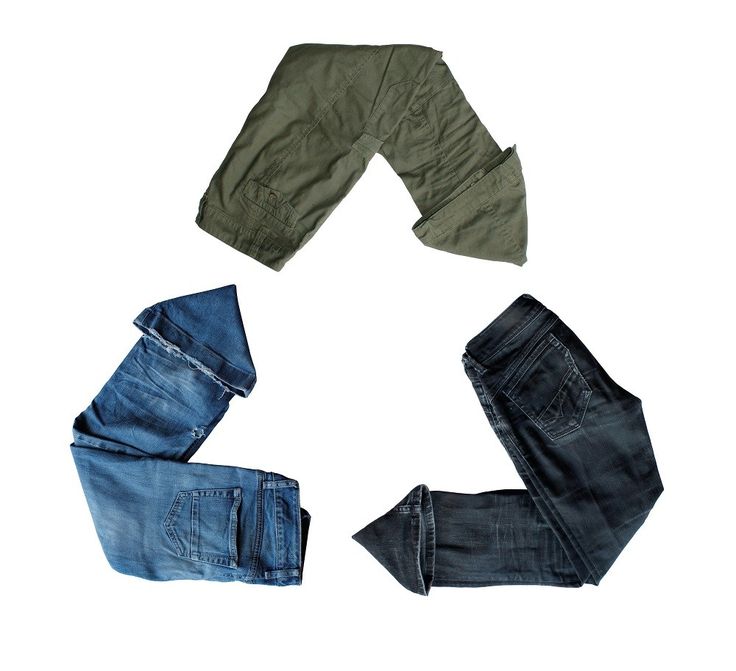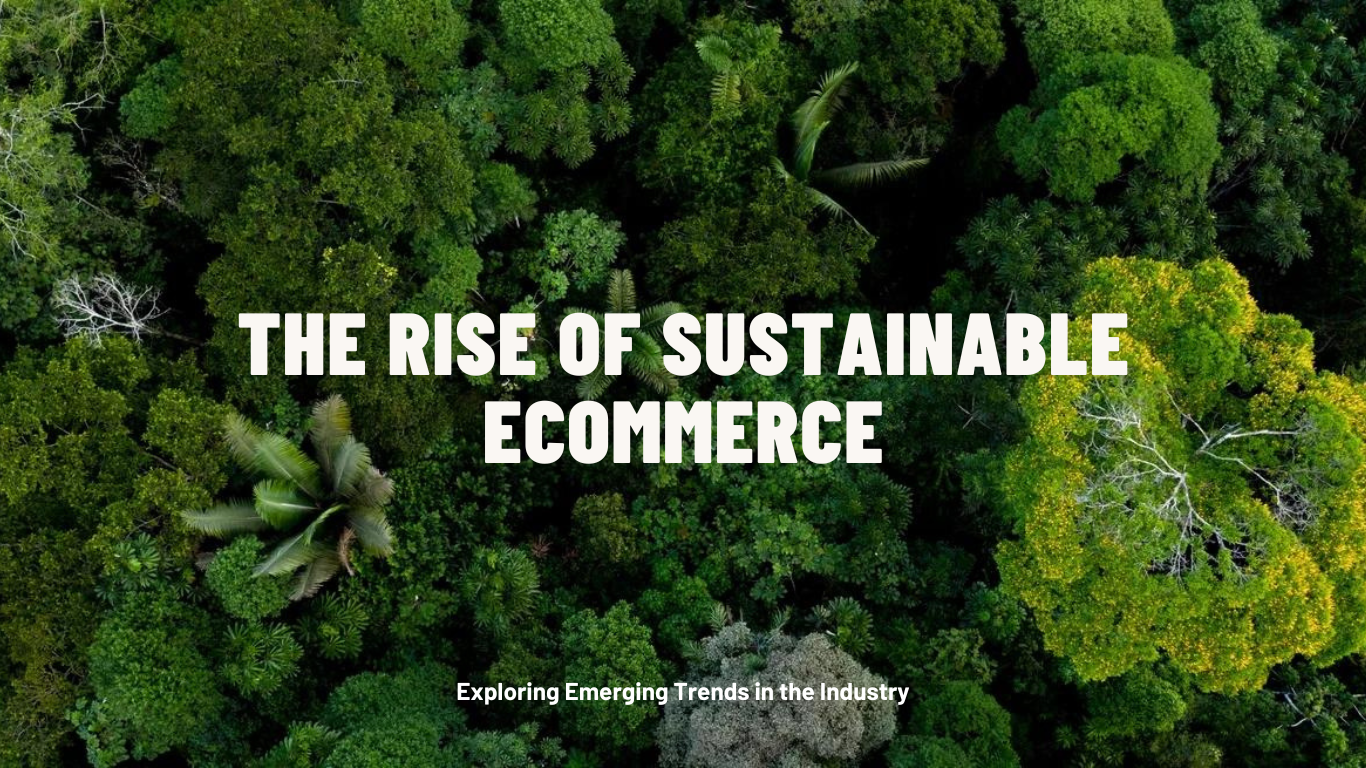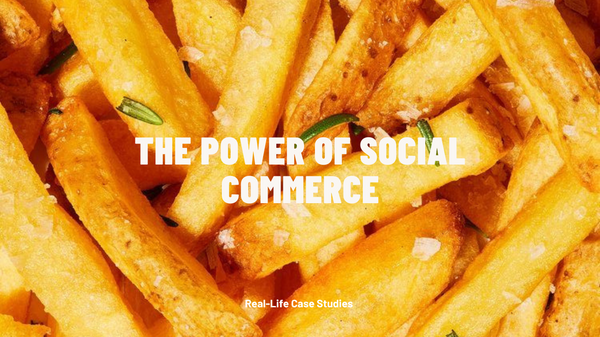In recent years, the concept of sustainability has become increasingly important in various industries, and e-commerce is no exception. Sustainable e-commerce refers to the practice of conducting online business operations in an environmentally friendly and socially responsible manner. This article will delve into the emerging trends in sustainable e-commerce, highlighting the significance of adopting green business practices and eco-friendly packaging options. Understanding the impact of sustainable e-commerce on the environment and consumer behavior helps us identify ways to implement sustainability practices in our own e-commerce businesses, as discussed by the IBM.

Why Sustainable E-commerce is Important
The importance of sustainable e-commerce cannot be overstated. As consumers become more conscious of their environmental footprint, they are actively seeking out businesses that align with their values. By embracing sustainability, e-commerce businesses can not only attract a larger customer base but also contribute to the well-being of the planet. Sustainable e-commerce practices involve reducing waste, conserving resources, and minimizing carbon emissions. Companies that prioritize sustainability gain a competitive edge in the market and establish themselves as responsible corporate citizens.
Get a Free Consultation with Our eCommerce Expert
Be the next success story by taking advantage of our offer for a free consultation with our eCommerce expert.
The Impact of Sustainable E-commerce on the Environment

Traditional e-commerce practices have a significant impact on the environment. From excessive packaging to inefficient supply chains, the carbon footprint of online businesses is considerable. However, sustainable e-commerce aims to mitigate these negative effects. By adopting eco-friendly packaging options and optimizing logistics, e-commerce businesses can reduce waste and lower carbon emissions. Moreover, sustainable practices encourage the use of renewable energy sources and promote responsible sourcing, further minimizing the environmental impact of e-commerce operations, as outlined in studies from Science Direct.
Emerging Trends in Sustainable E-commerce
The sustainable e-commerce landscape is evolving rapidly, influenced by changing consumer behaviors, technological advancements, and global sustainability goals like those defined by the United Nations.
Here's a deeper look into the specific trends shaping the industry and the rationale behind them:
1. Circular Economy Models

Circular economy models, as explained by the Ellen MacArthur Foundation, emphasize the reuse, recycling, and refurbishment of products, extending their life cycle and minimizing waste.This model stands in contrast to the traditional linear economy of "take, make, dispose."
Implementing circular economy principles helps in reducing environmental impact and promoting resource efficiency. For e-commerce, this means offering products that can be easily returned and recycled or repurposed, thereby fostering a more sustainable consumption pattern.
2. Renewable Energy Integration
More e-commerce businesses are shifting towards renewable energy sources like solar or wind power, detailed at Renewable Energy World.
By utilizing renewable energy, e-commerce companies can decrease their reliance on fossil fuels, lower their carbon emissions, and contribute positively to the fight against climate change. This transition not only helps the environment but also enhances the brand's reputation among environmentally conscious consumers.
3. Carbon-Neutral Shipping

Carbon-neutral shipping involves offsetting the greenhouse gas emissions produced during the transportation of goods, often by investing in renewable energy projects or reforestation efforts, as noted by the Carbon Trust.
As shipping is a major contributor to an e-commerce business’s carbon footprint, adopting carbon-neutral shipping practices demonstrates a company's commitment to sustainability. It addresses the consumer's growing concern about the environmental impact of their online purchases and can be a key differentiator in a competitive market.
4. Sustainable Packaging

Moving away from non-recyclable materials to biodegradable or recyclable options is a significant trend, with Sustainable Packaging Coalition offering resources on sustainable packaging. Involves using materials that are either biodegradable, recyclable, or made from recycled content.
Sustainable packaging reduces the environmental footprint of e-commerce products and meets consumer demand for more eco-friendly packaging solutions. It's a tangible way for businesses to showcase their sustainability efforts and reduce waste.
5. Transparency and Traceability
Consumers are increasingly demanding transparency in the supply chain, leading to a trend where businesses provide detailed information about the sourcing, manufacturing, and distribution of their products. The demand for supply chain transparency leads businesses to provide more information about their product sources, a trend driven by organizations like Fashion Revolution.
This trend is driven by the desire for ethical consumption, where consumers want to ensure that the products they purchase are not only environmentally friendly but also ethically produced. Transparency and traceability help build trust and loyalty with consumers, reinforcing a brand’s commitment to sustainability.
These trends illustrate a broader shift in the e-commerce industry towards more sustainable and responsible business practices. They not only respond to the growing consumer demand for greener options but also align with global sustainability objectives, helping to create a more sustainable future for the e-commerce sector.
Green Business Practices in the E-commerce Industry
To promote sustainability in e-commerce, it is crucial to adopt green business practices. This involves incorporating eco-friendly initiatives throughout the entire supply chain.
For instance, e-commerce businesses can prioritize working with suppliers that adhere to sustainable practices and certifications. Implementing energy-efficient technologies, such as LED lighting and smart energy management systems, can significantly reduce energy consumption in warehouses and fulfillment centers.
Furthermore, optimizing delivery routes and employing electric vehicles or bikes for last-mile delivery can help minimize carbon emissions.
Eco-Friendly Packaging Options for E-commerce Businesses

Packaging is one of the major sources of waste in the e-commerce industry. To address this issue, businesses can explore eco-friendly packaging options. Biodegradable or compostable materials, such as recycled cardboard or cornstarch-based packaging peanuts, can replace traditional plastic packaging.
Additionally, right-sizing packages to fit the products more efficiently reduces the need for excess filler material and minimizes waste. Another innovative solution is the use of reusable packaging systems, where customers return the packaging to be reused for future orders.
Incorporating green business practices throughout the supply chain is essential, as suggested by resources from the Green Business Benchmark.
The Role of Consumer Behavior in Sustainable E-commerce
Consumer behavior plays a pivotal role in driving the growth of sustainable e-commerce. As consumers become more environmentally conscious, they are actively seeking out sustainable products and businesses. By prioritizing transparency and showcasing their sustainability efforts, e-commerce businesses can better align with consumer values.
Offering eco-friendly product options, providing detailed information on sourcing and manufacturing practices, and engaging in corporate social responsibility initiatives can all contribute to attracting and retaining environmentally conscious customers.
Implementing Sustainability Practices in Your E-commerce Business
Implementing sustainability practices in your e-commerce business requires a thoughtful approach. Start by conducting a thorough assessment of your current operations to identify areas for improvement. Set sustainability goals and develop a roadmap to achieve them.
This may involve investing in renewable energy, optimizing packaging, or partnering with sustainable suppliers. Engage your employees and stakeholders in the process, as their support and input are invaluable. Regularly measure and track your progress to ensure that your sustainability initiatives are making a meaningful impact.
Case Studies of Successful Sustainable E-commerce Businesses
Several e-commerce businesses have successfully embraced sustainability and reaped the benefits.

Patagonia is a brand well-known for its commitment to sustainability and environmental responsibility. As an outdoor clothing and gear company, Patagonia places a strong emphasis on creating durable products and minimizing its environmental impact. This ethos is woven into every aspect of their business model, from product design and manufacturing processes to their corporate culture and marketing strategies.
Sustainability Practices

Patagonia's sustainability efforts are comprehensive and multifaceted. The company uses recycled materials in a large portion of its product line and is committed to fair trade practices, ensuring that workers in its supply chain are paid fair wages and work in safe conditions. They have also been pioneers in using organic cotton and developing innovative materials that reduce environmental impact.

Patagonia’s environmental initiatives extend beyond its products. The company actively participates in environmental conservation efforts, including donating a percentage of its profits to environmental causes through its "1% for the Planet" program. Additionally, Patagonia supports grassroots environmental organizations and engages in advocacy for environmental protection and sustainable policies.
Lifetime Guarantee

Patagonia’s commitment to sustainability is further demonstrated through its Ironclad Guarantee. This lifetime guarantee policy underscores the company's belief in the durability of its products and its commitment to customer satisfaction. The policy allows customers to return products at any time for repair, replacement, or refund if they do not perform to satisfaction.
This guarantee not only ensures that customers receive value for their investment but also aligns with the company’s sustainability goals by promoting the repair and continued use of products rather than disposal. Patagonia even encourages the repair of their products, offering services and guidance on how to fix items, which supports the company's ethos of reducing waste and promoting a more sustainable consumption model.
Patagonia’s dedication to sustainability and its lifetime guarantee policy set it apart as a company that not only talks about environmental responsibility but also lives by those values, proving that businesses can be successful while prioritizing the planet and its people.
The next sustainable brand is Eileen Fisher

Eileen Fisher is a clothing brand that emphasizes sustainability, ethical manufacturing, and social consciousness. The company is known for its use of organic and sustainable materials, such as organic cotton, recycled wool, and Tencel, which are less harmful to the environment.

Eileen Fisher is also committed to ethical business practices, including supporting human rights and fair labor conditions in its supply chain. The brand has initiatives for reducing waste, such as a recycling program where customers can return used clothing to be repurposed or recycled, aligning with their vision of circular fashion and sustainability.
Another notable case is Package Free Shop

Package Free Shop is an innovative retail business focused on promoting a zero-waste lifestyle. Founded by Lauren Singer, an environmental activist known for her blog "Trash is for Tossers," Package Free Shop aims to reduce waste by offering sustainable, reusable, and plastic-free products. The store provides a variety of items, from everyday essentials like bamboo toothbrushes and stainless steel water bottles to beauty products and cleaning supplies, all designed to minimize environmental impact.
Business Model and Mission
Package Free Shop's business model is centered around sustainability. The company carefully selects products that are not only eco-friendly but also effective and durable. By selling products without unnecessary packaging, they directly tackle the issue of waste and pollution associated with traditional retail. The store's mission is to make sustainable living accessible and easy for everyone, helping consumers to reduce their environmental footprint one product at a time.

Impact and Outreach
The impact of Package Free Shop extends beyond its product offerings. The company is an advocate for environmental education and sustainability practices, often participating in community events and online platforms to promote zero-waste lifestyles. Through its business practices and community engagement, Package Free Shop has become a leader in the zero-waste movement, inspiring both individuals and other businesses to consider sustainability in their daily operations and long-term strategies.
Conclusion: The Future of Sustainable E-commerce
As the world becomes increasingly aware of the importance of sustainability, the future of e-commerce lies in embracing green practices. Sustainable e-commerce is not just a passing trend; it is a necessity for the long-term well-being of our planet. By implementing eco-friendly packaging options, adopting green business practices, and aligning with consumer values, e-commerce businesses can position themselves at the forefront of the industry. Embracing sustainability not only benefits the environment but also enhances brand reputation and attracts a growing segment of environmentally conscious consumers. Let us seize this opportunity to make a positive impact and create a future where e-commerce and sustainability go hand in hand.



